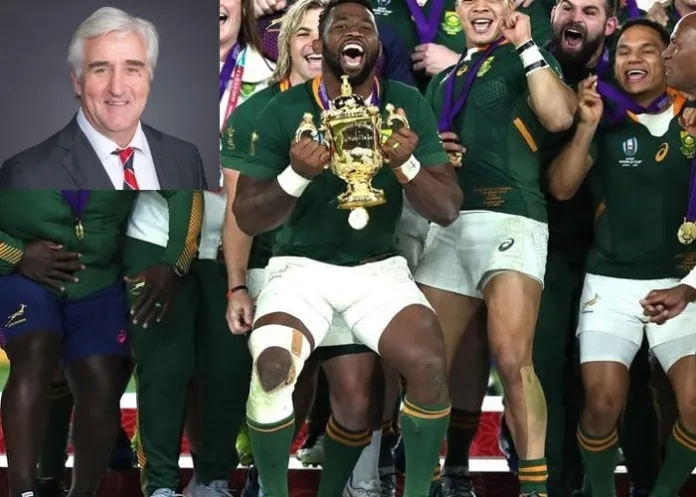Mental strength played an important role in Bok captain Siya Kolisi’s speedy recovery from a knee injury that saw him back in action and lifting the Webb Ellis Cup, says the doctor who saved his Rugby World Cup dream.
A week after reconstruction of an anterior cruciate ligament (ACL), known as full ACL reconstruction and meniscal repair, Kolisi was running and tackling to get in shape for the world’s biggest rugby tournament, “something that upset even those in the medical field, who said we were crazy to putting an athlete back in the field so early”, said Dr Willem van der Merwe.
The Cape Town knee surgeon has developed a new surgical technique – with orthopaedic surgeon Dr Neil van der Walt – to return athletes to competitive sport in three months.
“When Siya came to see me, in his mind the World Cup was gone. I said: ‘Listen, you have an injury. You’re not going to miss the World Cup.’ He had already spoken to Handre Pollard and Pieter-Steph du Toit, who said: ‘Go and see Dr Van der Merwe.’”
The Sunday Times reports that Pollard and Du Toit had similar injuries and healed within four months after treatment by Van der Merwe.
After discussing the procedure using hamstring tendons to build a new ligament, Van der Merwe said it was up to Kolisi to believe in healing and start exercising.
“Because we were happy that our surgery was strong enough to take anything, once he believed it, everything changed. We wanted him to go back to training. I told him to start cycling … get back on the field. He didn’t go to the gym or do big weights. He went to the field, ran, sidestepped, tackled.”
Kolisi played his first game in a World Cup warm-up match between the Springboks and Wales in August. His recovery time from the injury in April was just 119 days. The average return to play after an ACL injury and reconstruction is six to nine months.
Van der Merwe (63) graduated from the University of the Free State and later specialised in orthopaedics at the University of Cape Town. He studied at Oxford in the UK, honing his skills as a surgeon, and is considered an authority on knee surgery.
He said he was fortunate to work with Dr Freddie Fu from Pittsburgh on anatomic reconstruction of the ACL, learning a lot and “to always challenge dogma”.
A former president of the International Society of Knee Surgery, he is the only South African member of the ACL Study Group, an international group of orthopaedic surgeons who meet every two years to exchange information on ACL knee surgery, rehabilitation and injury prevention.
Van der Merwe said new evidence showed that the earlier the athletes returned to playing sport, the quicker they healed, as opposed to traditionally keeping them off the field for up to a year to recover.
“We have developed a new surgical technique to make athletes go back to sport earlier. But really, what we had to overcome is dogma. We think that if you if you keep athletes away from sport for too long, the muscles go away, they switch off.
“So right from the start there were two things we wanted to do with Siya. One was to do the surgery a little bit differently so the ligament was strong enough. The knee was strong from day one. We said ‘you cannot injure it’.”
After removing the damaged main ligament inside the knee, a new one was built using Kolisi’s hamstrings. An outside ligament (lateral tenodesis) that provides stability to the knee was also added to protect the ACL graft.
Van der Merwe said traditionally, reconstruction was done by placing the new graft at an angle, which sometimes failed due to excessive force. The new technique avoided this angle. The procedure is followed up with an MRI scan to ensure everything is fine.
“The idea is that you can start training from week one. And as soon as athletes actually believe that they can exercise, everything changes. The body heals itself much faster than we as traditional surgeons think,” he said.
“We said to Siya: ‘Your knee is fine … don’t worry about it’ … Once he believed he was fine the muscles came back, the swelling went away.”
Despite having performed the new technique on 24 people, including athletes, without failure, Van der Merwe said it was not well received.
The doctors were criticised when news of Kolisi’s swift recovery got out. They were labelled as “crazy for letting an athlete go back to training so early”, and said it was “going to cause re-injury”.
“Traditional medicine tends to ignore the things they cannot measure. When we operated on Siya we didn’t just decide to try something new; it’s something Dr Van der Walt and I had been studying for a while and we’ve learnt from the process,” said Van der Merwe.
Van der Walt, who specialises in knee surgery, had recently returned from a two-year fellowship in Australia where he trained in new and advanced techniques in ACL reconstruction. He said learning from one of the most respected surgeons in South Africa was rewarding.
“He can be quite controversial with his techniques as he is willing to push boundaries, but the nice thing about it is everything he does is based on evidence … it’s based on studies,” said Van der Walt.
Sunday Times PressReader article – The surgeons behind Siya’s second trophy (Open access)
See more from MedicalBrief archives:
10 years after ACL surgery, patients stay active with high quality of life

